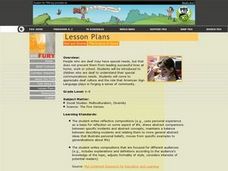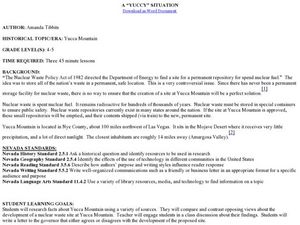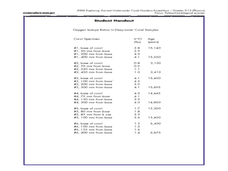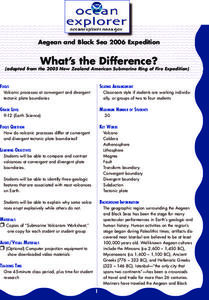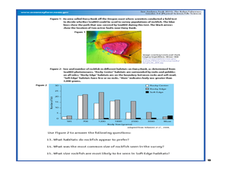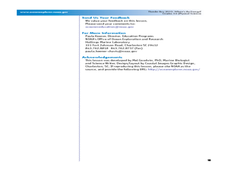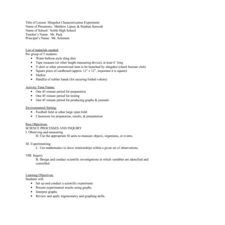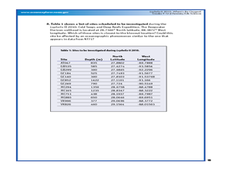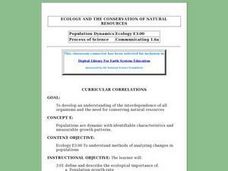Curated OER
Keeping Watch on Coral Reefs
High schoolers investigate the dangers Coral Reefs face by investigating satellite images. In this environmental protection lesson, students utilize the Internet to discover the types of satellites and sensors used to provide...
Curated OER
It's Going to Blow Up!
Students discover the major characteristics of volcanoes on the Pacific Ring of Fire. They describe the processes that produce the "Submarine Ring of Fire." students explain the factors that contribute to explosive volcanic eruptions.
Curated OER
Deaf and Diverse
Learners examine deaf culture and the role that American Sign Language plays in forging a sense of community.
Curated OER
A Yuccy Situation
Students examine the concept of nuclear waste storage. For this interdisciplinary lesson, students research Yucca Mountain in order to compare and contrast opposing views regarding the nuclear waste site there. Students compose a letter...
Curated OER
I'll Stay Here if It Kills Me!
Students examine coastal ecology. In this coastal resource lesson, students engage in several activities designed to examine the natural and cultural resources of coastal areas. Students then establish regulations to keep coastal areas...
Curated OER
Coral Reefs, Polyps and Heads
Students explore coral communities. They explore a coral polyp and build a coral head.
Curated OER
How can deep-water corals be used to determine long-term patterns of climate change?
Students explore the concept of paleoclimatological proxies. In this paleoclimatological proxies lesson, students explain isotope ratios in deep water coral samples. Students write a paragraph about global climate change as it effects...
Curated OER
X-Storms
Students compare and contrast 3 types of extreme storms. They obtain real-time and historical meteorological data regarding 2 specific storms and then analyze the data to determine what type of storm each was.
Curated OER
What's the Difference?
Students investigate volcanic processes at convergent and divergent
tectonic plate boundaries. They read and analyze diagrams, complete a worksheet, and write an essay.
Curated OER
Tracking Narwhals in Greenland The Ocean Unicorn
Students study the ecology, habitats, geographic range and feeding habits of narwhals. They determine at least three reasons for the decline in the narwhal populations and complete the accompanying worksheets.
Curated OER
The Robot Fisherman
Young scholars examine the use of robotic vehicles for fish surveys. In this ocean life lesson, students discuss the advantages and disadvantages of using underwater robots and the requirements an underwater robot must meet in order to...
Curated OER
Where's the Energy
Students research energy conversions. In this energy lesson plan, students describe the basic operation of a steam engine. They explain the energy conversions in the steam engine's operation.
Curated OER
Slingshot Characterization Experiment
Students set up and conduct a scientific experiment to demonstrate data collection. For this scientific process lesson, students complete an activity with the specific objective of using a slingshot to fire a t-shirt into the crowd at a...
Curated OER
CSI Rhino
Students study the rhinoceros and how the species has survived for so long. In this rhino lesson students create graphs and research what is being done to protect the rhino.
Curated OER
Water and Ice
Learners study the water cycle and states of matter. In this water cycle lesson plan, students observe ice for a period of time and record their observations. Learners create a Venn Diagram comparing water in solid form and liquid form....
Curated OER
Penguins and Their Habitats
First graders research and observe penguins in their natural habitats. They conduct Internet research, complete a penguin WebQuest, and compile information on a selected type of penguin. Using their research information they create a...
Curated OER
The Case of the Missing Water
Young scholars examine the major concepts related to the water cycle in this lesson. They recognize and define evaporation, condensation, precipitation and the natural cycles that occur as weather. They also participate in an activity...
Curated OER
Animal Habitats
Learners explore animal lifestyles by researching their characteristics. In this animal habitat lesson, students read the story Over in the Jungle and analyze the animal illustrations in the book. Learners create clay animal characters...
Curated OER
Our Special Planet Earth
Students explore what is special about our planet. They explore the various climates that are found on the planet Earth. Students create an advertisement to convince people why their favorite environment would be the best place to visit.
Curated OER
Picture This!
Students compare and contrast different types of light on the electromagnetic spectrum. In this investigative lesson students create a photographic image that demonstrates the infrared, ultraviolet and polarization phenomena.
Curated OER
Life Cycles
Students explore the parts of a flower and pollination of flowers. In this plants lesson, students use an interactive whiteboard to label the parts of a plant and the functions of each part. Students complete a worksheet as an assessment.
Curated OER
Where's the Oxygen?
Young scholars study seawater and how temperature and salinity influence it. In this oxygen lesson students complete a lab activity on dissolved oxygen.
Curated OER
Twisted Vision
Students investigate the vision adaptations in marine animals in their environments. In this life science lesson, students use polarized filters and make observations. Students explain how the adaptation of polarized vision is an...
Curated OER
Population Dynamics (Lesson 2)
Middle schoolers discuss the importance of population growth rates. They examine mortality and survival curves and participate in an experiment. They record their observations and discuss.




